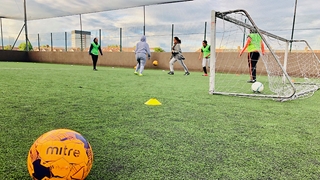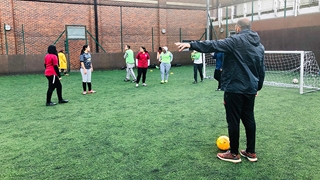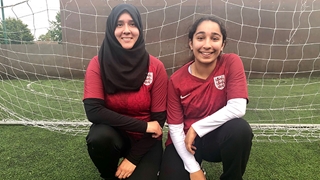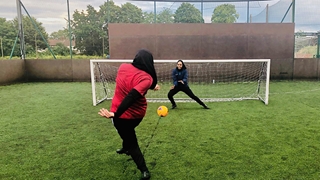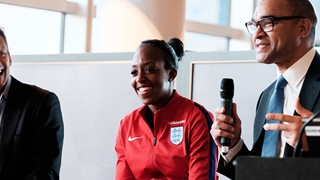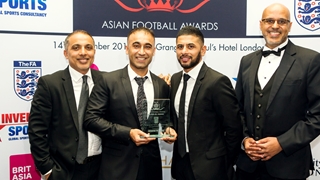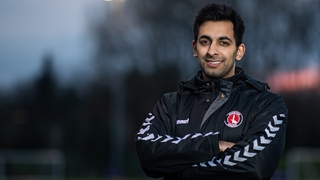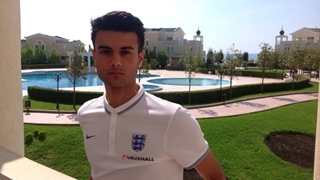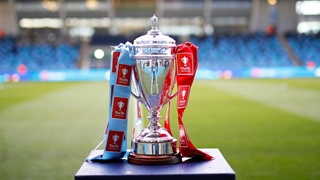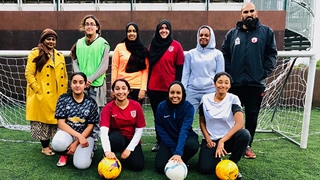
When the Muslimah Sports Association (MSA) first launched in 2014 they had just a handful of members across Essex.
Founder Yashmin Harun knew there was a huge appetite for young Muslim girls to play sport and train as coaches, but there were cultural barriers to overcome and funding wasn’t easy.
“The MSA was originally for Muslim women who wanted an outlet to play sport that catered for their religious or cultural needs,” Harun tells TheFA.com.
“It was hard at first and I was told to give up, but I just knew there were Muslim women out there like me.
“Over time we won the support of local community leaders and then started to spread our message through social media. That sparked interest and as numbers improved I decided to target not just Muslims, but people from black, Asian and minority ethnic (BAME) backgrounds as well.”
As word spread, a series of suitable sports clubs were found that could facilitate weekly training sessions for boxing, basketball, pilates, fencing and, most importantly, football – MSA’s most popular sport.
Their first flurry with football was in a mosque, but with demand and support increasing, they soon moved to Frenford Clubs – one of The FA’s SSE Wildcat centres designed to provide girls aged 5-11 with an introduction to football.
FIND OUT MORE ABOUT MUSLIMAH SAMSA also host outdoor coaching sessions for players aged 16-35 who are part of a five-a-side league in Hackney and closed indoor sessions for girls and women of all standards who prefer a more private and social football experience.
“We have two types of players,” says Harun, whose niece is at West Ham United’s academy. “There are those who want to improve their skills and those who want to use football to relax, take off their hijab and enjoy sport in a safe space."
“Offering different sessions for different needs has really helped us grow,” adds Neal Akhtar, an MSC coach and Frenford Clubs’ development officer. “The key is to not only source players, but to create female Muslim or BAME role models.
"We’ve got some already in men’s sport. My kids, for instance, currently have Mo Salah fever and outside of football, most British Muslims feel immense pride at what Mo Farah has achieved.
“That’s why a strong performance from England at the Women’s World Cup is going to have a huge impact for the MSA. We noticed a surge in numbers after the last World Cup in Canada from around 150 to 500, especially girls under 18 who saw England on TV for the first time.”
Four years ago, the Lionesses returned home as England’s most successful football team in a half a century. Their quarter-final victory against Canada, and subsequent bronze medal, led to the likes of Laura Bassett and Fara Williams becoming household names.
The FA built on that success by launching We Can Play – a campaign designed to shatter pre-conceptions about female football and boost participation by supporting over 100,000 girls and parents.
England’s heroics in 2015 proved the first significant taste of elite women’s football for many MSA players. Yasmin Hussain vividly remembers Williams’ extra-time penalty against Germany to land third place, after the heartbreak of their semi-final defeat to Japan days earlier.
It inspired her to become a coach and she is currently benefiting from The FA’s pledge to raise the number of Muslim and BAME female leaders from five to 11 percent by 2021.
“I only realised England had a women’s team in 2015,” admits Hussain, who wears her Lionesses shirt to training. “It’s amazing to now see England’s women all over the place during this World Cup. It was also cool to watch Prince William and David Beckham help announce the squad.
“The Lionesses’ success and media exposure kind of fueled my love for football and I am thankful to the MSA and FA for giving me the tools to learn because when I first started I didn’t even know the basics.
“I always loved football, but when I turned 13 my mum told me to stop playing. She thought it was a sport for boys, but she’s proud of me now because I give back to the community. She even keeps across the games and knows when my team, Manchester United, play, so doesn’t disturb me!”
Hussain coaches around ten girls each week, including fellow Manchester United fan Hanna Ahmed. The 16-year-old only joined the MSA this summer as a welcome break from GCSE revision.
“Football is definitely a stress reliever,” says Hussain, who hopes to study sports psychology at university.
“Now my exams are over, I have been watching all of England’s games in France. They look strong. I saw them beat Japan a few days ago. Their combinations were great, but they did get a bit sloppy at times. If they tidy things up I think they can win the tournament.
“I really respect Ellen White because she never gives up and her goal against Japan was an excellent finish from a tight angle. As a Manchester United supporter, I love Lauren James, too. She’s only a year older than me and I think she will probably make the next Women’s World Cup.
“I hope the first Muslim player for England will come from my generation and the MSA and FA can definitely play a big part in finding and training them. The main way to do this is through more female coaches, like Yasmin [Hussain].
“Personally, I feel more comfortable with a female coach who is from the same background as me. I don’t think gender, race or religion should hold anyone back. You just have to follow your dreams, but if you can see someone just like you laying a pathway it definitely helps.”
With young talent like Ahmed coming through – and aspiring to be both footballers and leaders – the future is bright for the MSA. And founder Harun expects another fresh surge in membership after this summer’s Women’s World Cup ends – one that will be virtually guaranteed if England lift the trophy.
“I want to see England win and I hope France do well, too, because they have plenty of BAME players,” she says.
“I think the message this World Cup sends is that football is for every single girl, while here at the MSA we want to show we are inclusive. Sometimes people think we are only for Muslims, but we are for absolutely anyone who loves football.”
FIND OUT MORE ABOUT MUSLIMAH SA

